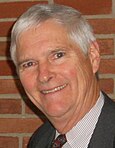2012 Libertarian National Convention
|
2012 presidential election |
|
 
Nominees
Johnson and Gray |
|
| Convention | |
|---|---|
| Date(s) | May 2–6, 2012 |
| City | Las Vegas, Nevada |
| Venue | Red Rock Resort Spa and Casino |
| Chair | Ruth Bennett (WA) |
| Keynote speaker | Michael Cloud |
| Notable speakers |
Theodora "Tonie" Nathan Edward Clark Mary Ruwart R. Lee Wrights |
| Candidates | |
| Presidential nominee | Gary Johnson of New Mexico |
| Vice Presidential nominee | James P. Gray of California |
| Voting | |
| Total delegates | 593 |
| Votes needed for nomination | 297 |
The 2012 United States Libertarian National Convention, in which delegates of the Libertarian Party (LP) chose the party's nominees for President of the United States and Vice President of the United States in the 2012 general election, was held May 2–6, 2012 in Las Vegas, Nevada at the Red Rock Resort Spa and Casino. Former Governor of New Mexico Gary Johnson won the presidential nomination on the first ballot. Retired California state court judge Jim Gray won the vice-presidential nomination, also on the first ballot. The convention also chose to replace most of the Libertarian National Committee party officers and members-at-large.
The theme of this convention was Liberty Will Win.
This was the first presidential nominating convention ever held in the Las Vegas Valley. Other cities that bid to host the convention included Dallas, Texas and San Francisco, California.
In February 2012, Gary Johnson, Lee Wrights, Bill Still, Carl Person, and Leroy Saunders participated in a debate held by the Libertarian Party of Florida and moderated by LPUSA Chair Mark Hinkle. The debate participants were selected by convention delegates in a secret ballot, in which a candidate needed to score 10 percent of the vote or higher to be allowed to take part. Libertarian candidates in the debate called for ending government interference in personal, family and business decisions; much lower government spending; deregulation; lower taxes; a currency free of government manipulation; free trade; and a peaceful, non-interventionist foreign policy.
...
Wikipedia
